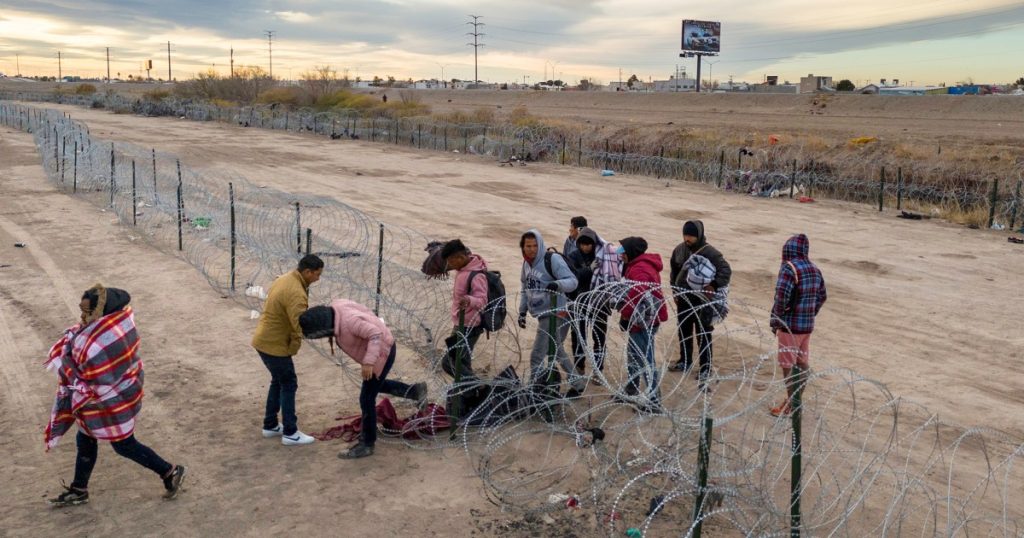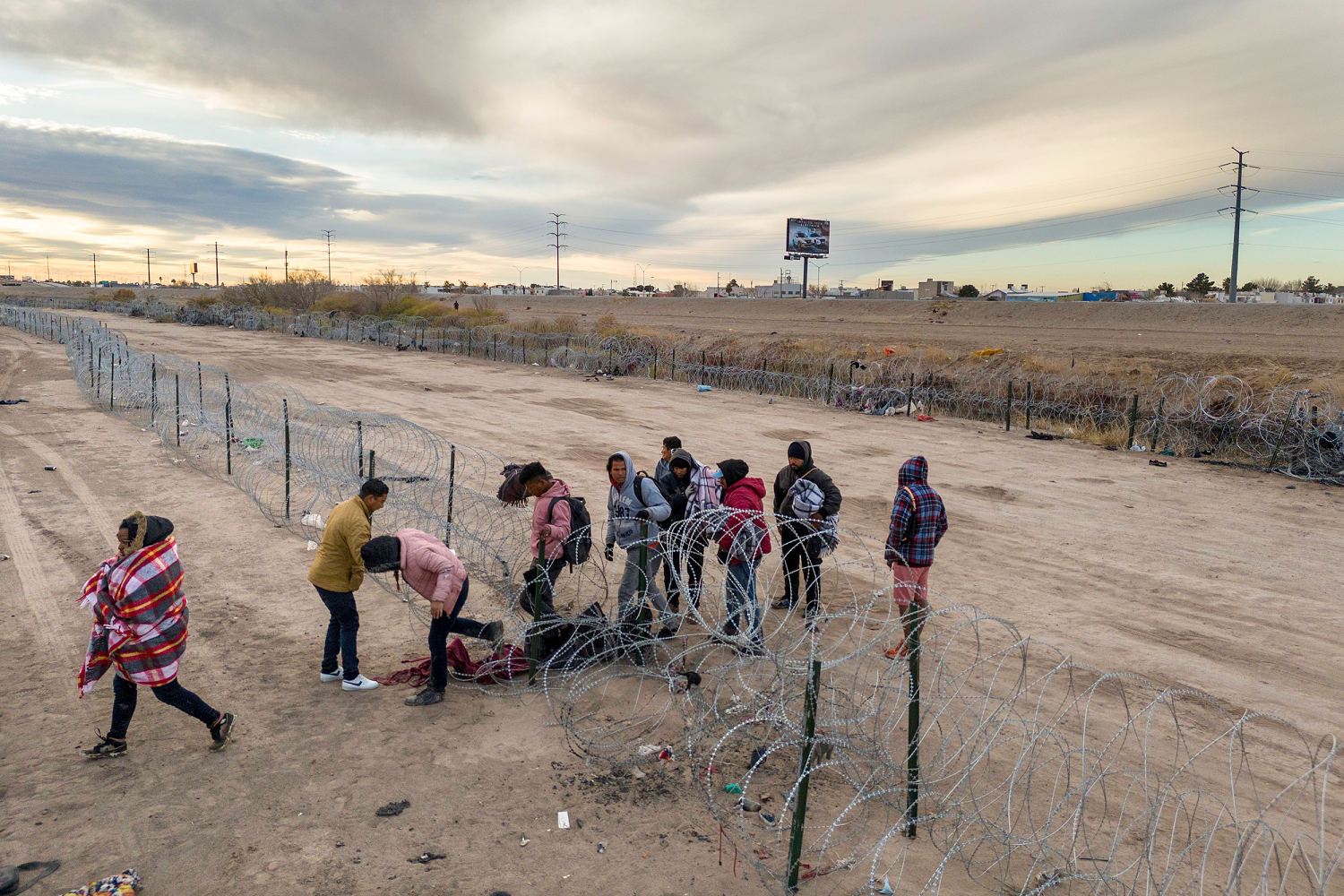

WASHINGTON — Senators released the long-awaited text of a bipartisan agreement to impose tougher immigration and asylum laws Sunday, as Senate Majority Leader Chuck Schumer eyes votes on the package this week.
The $118 billion package includes a series of provisions aimed at reducing record-high crossings at the southern border and tightening an asylum system that has been overwhelmed by migrants fleeing their homes to seek refuge. It also includes critical aid to Israel, Ukraine and Taiwan, which Republicans have said they’ll only support if it is paired with significant new U.S. immigration restrictions.
The agreement — reached by Sens. James Lankford, R-Okla., Chris Murphy, D-Conn., and Kyrsten Sinema, I-Ariz. — would be the most aggressive border security and migration overhaul bill in decades if it passes Congress. It would raise the standard to get asylum, send away those who don’t qualify and expedite cases for those who do.
“The Senate’s bipartisan agreement is a monumental step towards strengthening America’s national security abroad and along our borders,” Schumer, D-N.Y., said in a statement. “This is one of the most necessary and important pieces of legislation Congress has put forward in years to ensure America’s future prosperity and security.”
But the deal is mired in election-year politics, and it’s unclear whether it has the support to pass the Senate, where it will need at least 60 votes to defeat a guaranteed filibuster. Conservative senators have been mobilizing against the deal, egged on by former President Donald Trump, who has told Republicans to reject it if it isn’t “perfect.” He has also falsely suggested that the bill would allow 5,000 illegal border crossings per day as he seeks to wield border chaos as a political weapon in a likely 2024 rematch against President Joe Biden, who quickly endorsed the bill.
Changes to asylum and immigration laws
The bill includes a new emergency authority that would allow the Department of Homeland Security to, as Biden has put it, “shut down” the border if there are too many migrants trying to cross.
DHS could close the border if Border Patrol encounters 4,000 or more migrants on average over a seven-day period. The border would have to be shut down if those encounters reached a seven-day average of 5,000 or if they exceeded 8,500 in a single day.
The border couldn’t be shut down under this authority for more than 270 days in the first year. And the bill would give the president the power to suspend a border closure “on an emergency basis for up to 45 days if it is in the national interest.”
During an emergency closure, Border Patrol would still need to process a minimum of 1,400 migrants who try to enter the U.S. legally through ports of entry. Only unaccompanied minors would be able to cross between ports of entry. And any migrant who tried to cross illegally two or more times during a border emergency would be barred from the U.S. for a year.
That “consequence,” Sinema said, represents “one key difference between the use of Title 42 and our new border authority. It will create disincentives for individuals who seek to cross illegally into the country during border closure.”
Current and former DHS officials had told NBC News that the emergency shutdown provision in the bill would cause chaos and might not be effective unless Mexico agreed to take more migrants turned away from the U.S. The bill doesn’t include new cooperation from Mexico.
The bill doesn’t address the children of undocumented people, known as DREAMers, long a priority of Democrats. It would change immigration laws to allow the children of people with H-1B visas to get work authorizations and freeze their legal ages while waiting for green cards, rather than face deportation once they hit age 21. While they wait, those children would be able to have work authorizations.
The bill would also add new flexibility for U.S. Citizenship and Immigration Services, Immigration and Customs Enforcement and Customs and Border Patrol to make new hires, seeking to address staffing shortages. The changes in hiring authorities are all set to sunset in the next few years and would have to be renewed.
Billions in aid
Defense and foreign policy hawks on Capitol Hill hope the immigration deal will unlock billions of dollars in military and other foreign aid that has been languishing because of demands made by House Republicans.
A huge chunk of the security package — slightly more than $60 billion — would go toward supporting Ukraine as it defends itself against the Russian invasion. That includes funding for things like military training, intelligence sharing and replenishing military weapons and equipment.
More than $14 billion would pay for security assistance for Israel following the deadly Oct. 7 attack by Hamas terrorists, while another $10 billion in humanitarian assistance would help provide things like food, water, shelter and medical care to civilians in Gaza and the West Bank who have been affected by the war there.
Two days after Biden launched airstrikes against Iranian-backed targets in the Middle East in retaliation for the deaths of three U.S. service members, congressional leaders also included $2.44 billion to support U.S. Central Command operations and pay for combat expenses linked to the conflict in the Red Sea.
Selling the deal
“It will make our country safer, make our border more secure, treat people fairly and humanely while preserving legal immigration, consistent with our values as a nation,” Biden said in a statement Sunday. “It would give me, as President, a new emergency authority to shut down the border when it becomes overwhelmed. I urge Congress to come together and swiftly pass this bipartisan agreement. Get it to my desk so I can sign it into law immediately.”
Lankford, the chief GOP negotiator, touted the asylum and immigration changes in the legislation.
“The border security bill will put a huge number of new enforcement tools in the hands of a future administration and push the current Administration to finally stop the illegal flow,” he said in a statement. “The bill provides funding to build the wall, increase technology at the border, and add more detention beds, more agents, and more deportation flights. The border security bill ends the abuse of parole on our southwest border that has waived in over a million people. It dramatically changes our ambiguous asylum laws by conducting fast screenings at a higher standard of evidence, limited appeals, and fast deportation.”
Senate Minority Leader Mitch McConnell, R-Ky., praised the bill for providing “direct and immediate solutions to the crisis at our southern border.” He added that America’s sovereignty “is being tested here at home” and that adversaries are watching.
“The challenges we face will not resolve themselves, nor will our adversaries wait for America to muster the resolve to meet them,” he added in a statement. “The Senate must carefully consider the opportunity in front of us and prepare to act.”
Schumer said he had “worked more closely with Leader McConnell on any piece of legislation as we did on this.”
“On many occasions, we thought the negotiations had fallen apart, but we knew it was too important to give up and we persisted and now have come to this agreement,” he said.
Sinema made her case for the immigration changes Sunday.
“We’ll no longer have people just entering the country and maybe going to court in the next seven or 10 years,” she said Sunday on CBS’ “Face the Nation.” “Instead, we’ll make swift justice. Folks who do qualify for asylum will be on a rapid path — six months or less — to start a new life in America. And those who do not qualify will quickly be returned to their home countries.”
The package also includes bipartisan sweeteners, including the FEND Off Fentanyl Act, which would target, sanction and block the financial assets of people involved in the fentanyl supply chain, from chemical suppliers in China to drug traffickers from Mexico. The anti-fentanyl bill is authored by the leaders of the Senate Banking Committee, Tim Scott, R-S.C., and Sherrod Brown, D-Ohio, and it has support from 67 senators.
Right-leaning Senate Republicans have blasted the deal for not going far enough. The bill may also lose support from some progressives and Hispanic Caucus members, who worry that Democrats are conceding too much and complain that they’ve been shut out of negotiations.
“Every time it gets to this immigration stuff, regardless of who the president is, they always err on the side of being stricter,” said Rep. Raúl Grijalva, D-Ariz., a member of the Hispanic Caucus and a former leader of the Progressive Caucus. “A lot of Democrats are going to be in a tough spot when that comes over, and if the Republicans here don’t support it, it’s never going to see the light of day.”
Prospects in the House
The package could face long odds in the House. In his maiden floor speech last week, entirely focused on border security, Speaker Mike Johnson, R-La., slammed the emerging Senate legislation for not going far enough to stop illegal immigration: This “so-called deal does not include these transformational policy changes that are needed to actually stop the border catastrophe,” he said.
Johnson announced Saturday that the House will vote in the week ahead on a stand-alone Israel aid bill, without any border provisions or Ukraine funding.
Sen. Markwayne Mullin, R-Okla., who served in the House with Johnson and discussed the Senate border deal with him last week, conceded that it’s a politically tricky issue for Republicans to touch during an election year and that it most likely doesn’t have backing from a majority of the 219-member House GOP conference.
“Here’s the issue that the speaker has: He can’t bring a bill to the floor without the majority of the majority. At this point, it’s very tough to say that the House has a majority of the majority to bring it to the floor,” Mullin told reporters after meeting with Johnson. “You have a lot of people up for re-election, and the perception of the American people is that it’s bad. So it’s really hard to get ahead of that.”
There are other challenges in the House, as well. As Johnson faces pressure from his right flank, House Republicans are readying a floor vote to impeach Homeland Security Secretary Alejandro Mayorkas, one of several administration officials who met with senators as they crafted the new immigration deal. House Republicans are accusing him and Biden of failing to enforce immigration laws and secure the southern border.
“No president in the history of our county has ever done more to intentionally harm the United States than what the president has done with the border invasion,” said Rep. Bob Good, R-Va., the leader of the far-right Freedom Caucus, whose members have aggressively pushed for impeachment.

 Latest Breaking News Online News Portal
Latest Breaking News Online News Portal




